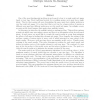Free Online Productivity Tools
i2Speak
i2Symbol
i2OCR
iTex2Img
iWeb2Print
iWeb2Shot
i2Type
iPdf2Split
iPdf2Merge
i2Bopomofo
i2Arabic
i2Style
i2Image
i2PDF
iLatex2Rtf
Sci2ools
STOC
2009
ACM
2009
ACM
Multiple intents re-ranking
One of the most fundamental problems in web search is how to re-rank result web pages based on user logs. Most traditional models for re-ranking assume each query has a single intent. That is, they assume all users formulating the same query have similar preferences over the result web pages. It is clear that this is not true for a large portion of queries as different users may have different preferences over the result web pages. Accordingly, a more accurate model should assume that queries have multiple intents. In this paper, we introduce the multiple intents re-ranking problem. This problem captures scenarios in which some user makes a query, and there is no information about its real search intent. In such cases, one would like to re-rank the search results in a way that minimizes the efforts of all users in finding their relevant web pages. More formally, the setting of this problem consists of various types of users, each of which interested in some subset of the search result...
Related Content
| Added | 23 Nov 2009 |
| Updated | 23 Nov 2009 |
| Type | Conference |
| Year | 2009 |
| Where | STOC |
| Authors | Yossi Azar, Iftah Gamzu, Xiaoxin Yin |
Comments (0)

